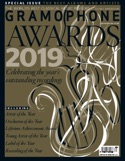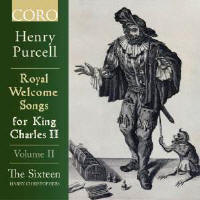Texte paru dans: / Appeared in: Code-barres / Barcode : 828021617324 |
|
|
Outil de traduction (Très approximatif) |
|
|
Reviewer: David Vickers Harry Christophers presents two odes (neither of them ‘Welcome Songs for Charles II’), three diverse sacred anthems, a couple of secular solo songs and a few eclectic little pieces that collectively attest to the genius of the English Orpheus. Welcome to all the pleasures was commissioned for the Musical Society’s celebration of St Cecilia’s Day in 1683. The symphony is played with neatly poised sincerity by an excellent dozen-strong string band of three players per part (rightly, no double basses double the cellos). ‘Here the deities approve’ is sung by countertenor Daniel Collins with poetic softness and some hints of unease (it was probably intended for high tenor). The tasteful continuo-playing of Alastair Ross (keyboards), David Miller (theorbo) and Frances Kelly (harp – an instrument Purcell never employed) is astute to serving the needs of the singers, nowhere more so than in the impeccably balanced choral refrain ‘Then lift up your voices, ye organs of Nature’. The solo ‘Beauty, thou scene of love’ is credited incorrectly to bass Ben Davies but actually sung gorgeously by high tenor Mark Dobell.
From hardy climes and dangerous toils of war celebrated the marriage of Prince George of Denmark and Princess (later Queen) Anne in July 1683. After a string symphony of joyous conviviality, the Dane’s prowess as a warrior is proclaimed resonantly by bass Stuart Young. The ode’s memorable core recounts the blissful love between a sparrow and a gentle dove blessed by Venus; Dobell’s cultured singing leads into a chaconne for strings that springs deliciously surprising modulations. Katy Hill’s ‘O solitude, my sweetest choice’ conveys sorrowful vulnerability. Kirsty Hopkins’s communication of character and text concerning madness in ‘From silent shades and the Elysian’ groves (‘Bess of Bedlam’) has clarity and intelligence (four continuo instruments is arguably three more than necessary). The trio of Budd, Dobell and Young conjure plangent low-textured density in the domestic devotional song ‘Plung’d in the confines of despair’. At the other end of the spectrum, three tenors imitate the scraping of an amateur viol player in the witty catch ‘Of all the instruments that are’. Eight solo voices of technical finesse deliver crisp diction in Hear my prayer, O Lord, although emotionally it narrowly misses the mark. The simple full anthem Lord, how long wilt thou be angry has expressively harmonious five-part singing, whereas the symphony verse anthem In thee, O Lord, do I put my trust is an inventive dialogue between strings and three soloists (Collins, Dobell and Davies) in varying adept combinations before closing with an Alleluia jig. A melancholic Pavan of Four Parts in G minor (c1678) means almost the full gamut of Purcell’s mastery is on offer. |
|




